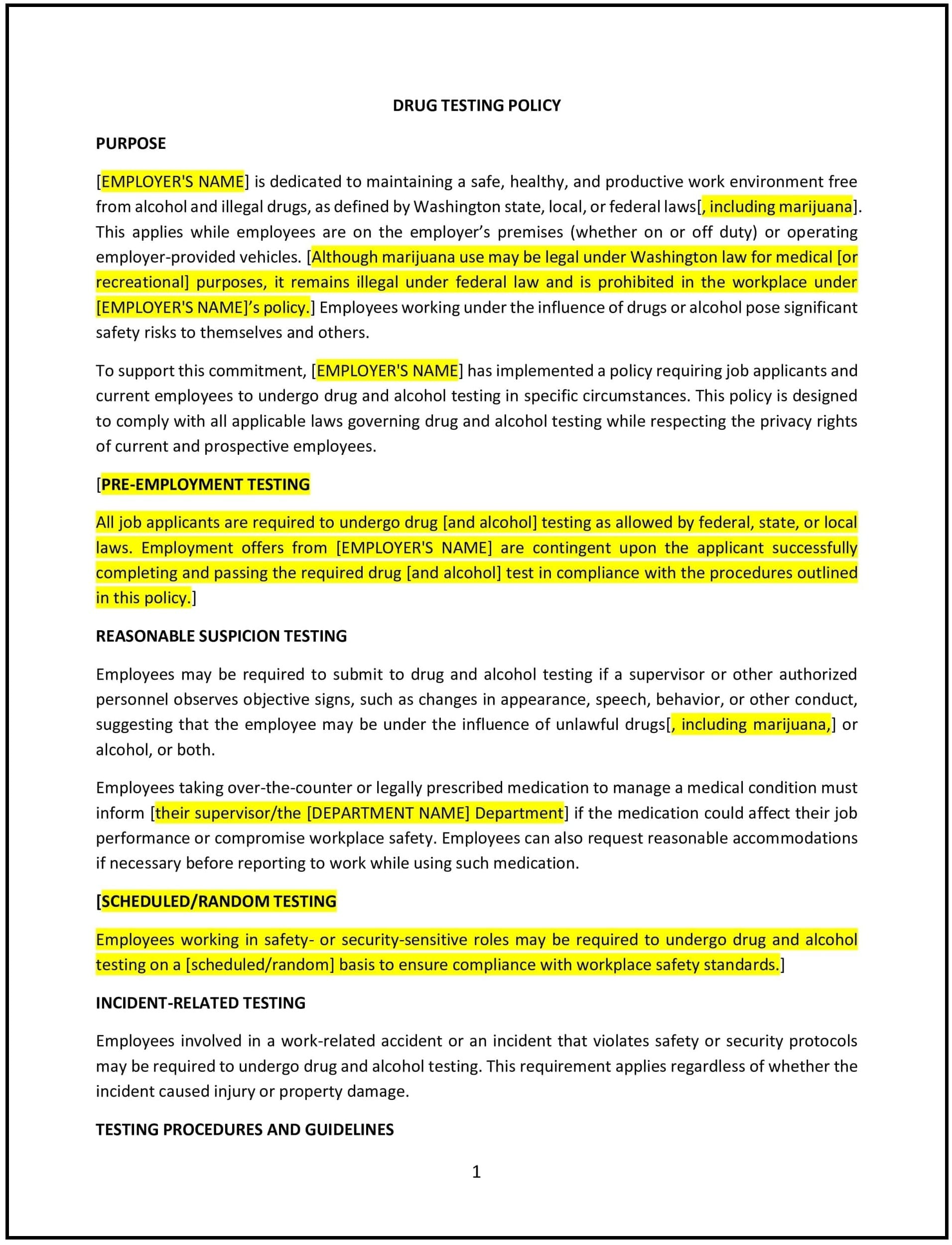Got contracts to review? While you're here for policies, let Cobrief make contract review effortless—start your free review now.

Customize this template for free
This drug testing policy is designed to help Washington businesses establish guidelines for drug testing in the workplace. The policy outlines the circumstances under which drug testing will be conducted, the procedures to follow, and the consequences of violating the company’s drug use and testing standards. The policy helps ensure that businesses maintain a safe, productive, and legally compliant work environment, while also addressing employee privacy and rights.
By adopting this policy, businesses can promote a safe and healthy workplace, reduce the risk of accidents, and comply with Washington state laws and federal regulations regarding drug testing.
How to use this drug testing policy (Washington)
- Define the scope of the policy: Clearly outline which employees are subject to drug testing, such as those in safety-sensitive positions, new hires, employees returning from leave, or those involved in accidents or violations. Specify whether the policy applies to all employees or only specific departments.
- Establish testing procedures: Outline the procedures for drug testing, including the types of tests to be used (e.g., urine, saliva, blood tests), when they will occur (pre-employment, random, post-accident), and the method for collecting samples. The policy should ensure that tests are conducted in a fair, non-discriminatory manner.
- Specify drug use prohibitions: The policy should specify which drugs are prohibited, including illegal substances and certain prescription drugs that may impair an employee’s ability to perform their duties safely. It should also address the use of alcohol and cannabis, where applicable, in the workplace.
- Address consequences of positive test results: The policy should outline the consequences for employees who test positive for drugs, such as suspension, mandatory rehabilitation, or termination. It should be clear about the disciplinary actions that will follow a positive result and how employees will be treated fairly throughout the process.
- Ensure confidentiality: The policy should guarantee that drug test results will be kept confidential and only shared with authorized personnel who need to know. It should address how test results will be handled and how privacy laws will be adhered to.
- Provide information about employee rights: The policy should inform employees about their rights regarding drug testing, including the right to contest a positive result, the right to request a retest, and any legal protections available to them under Washington state and federal laws.
- Promote compliance with Washington and federal laws: The policy should comply with Washington state laws regarding drug testing in the workplace, as well as relevant federal regulations, including those set forth by the Department of Transportation (DOT) for certain safety-sensitive positions.
- Review and update regularly: Periodically review and update the policy to ensure it is compliant with Washington state laws, federal regulations, and any changes in the company’s operations or workforce.
Benefits of using this drug testing policy (Washington)
This policy offers several benefits for Washington businesses:
- Promotes a safe and healthy workplace: Drug testing helps reduce workplace accidents and injuries, especially in safety-sensitive roles, by ensuring that employees are fit to perform their duties without impairment.
- Enhances productivity: A drug-free workplace is conducive to higher productivity and fewer disruptions caused by drug-related issues, contributing to a more efficient work environment.
- Supports legal compliance: The policy helps businesses comply with Washington state drug testing laws and federal regulations, reducing the risk of legal challenges or disputes related to drug testing practices.
- Protects the company’s reputation: By implementing a fair and transparent drug testing policy, businesses demonstrate their commitment to maintaining a safe, respectful, and professional work environment, which can enhance their reputation among employees and customers.
- Reduces liability: Drug testing policies help businesses identify and address substance abuse issues early, minimizing the potential for accidents, injuries, or lawsuits that could result from impaired employees.
- Encourages employee well-being: By providing resources for rehabilitation or assistance programs, the policy encourages employees to seek help if they have a substance abuse issue, supporting their well-being and helping them remain productive members of the team.
Tips for using this drug testing policy (Washington)
- Communicate the policy clearly: Ensure that all employees are aware of the drug testing policy and understand the circumstances under which testing will occur. Include the policy in the employee handbook, review it during onboarding, and provide regular reminders.
- Train managers and HR personnel: Provide training for managers and HR personnel on how to administer drug tests, handle positive results, and support employees through the testing process. This ensures that the policy is enforced consistently and fairly.
- Monitor compliance: Regularly audit the company’s drug testing procedures to ensure that they are being followed and that employees are treated fairly. This can help prevent issues with discrimination or inconsistencies in how tests are administered.
- Protect employee privacy: Ensure that all drug test results are kept confidential, in compliance with privacy laws. Only authorized individuals should have access to test results.
- Provide support for employees: If an employee tests positive, offer access to rehabilitation programs or other support to help them overcome any substance abuse issues and maintain their employment.
- Review and update regularly: Periodically review the policy to ensure it remains compliant with Washington state laws, federal regulations, and any changes in the company’s operations. Regular updates will help keep the policy relevant and effective.